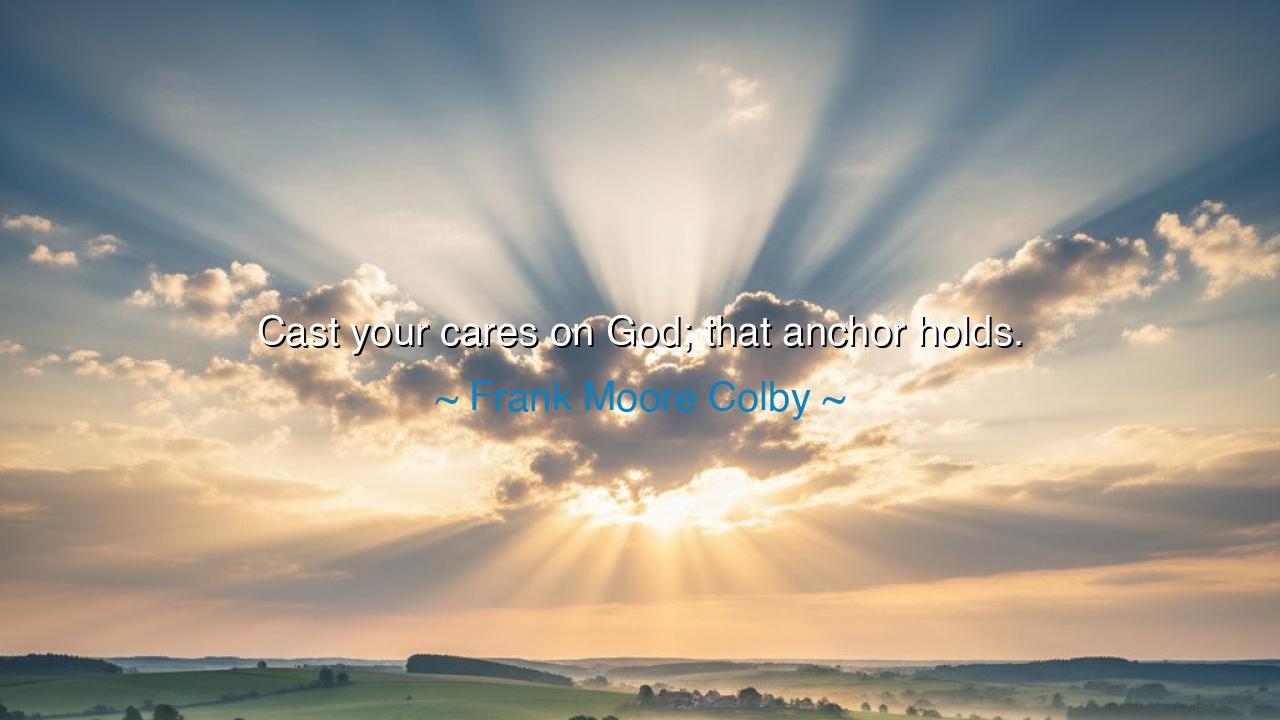
Cast your cares on God; that anchor holds.






“Cast your cares on God; that anchor holds.” Thus wrote Frank Moore Colby, a man of letters who, though not a prophet of the pulpit, spoke words that echo with eternal strength. In this brief yet mighty saying, he joins the wisdom of ages past with the courage of the soul that has faced the storms of life. To “cast your cares on God” is to lift the burden from trembling human hands and place it in the grasp of the Divine, whose strength never falters, whose love never fails. And to say “that anchor holds” is to proclaim that amid the fury of life’s tempests, there is a steadfast power that will not break nor drift.
The image of the anchor has long been sacred among those who face the vast and unpredictable seas of existence. In ancient times, the anchor was the sailor’s hope—the one assurance against chaos when the winds rose and the waves thundered. In the same way, faith is the anchor of the soul. The winds may howl, the ship may shudder, but if the anchor grips the rock beneath, the vessel will endure. Colby’s words breathe this truth anew: God is that rock, and trust is the chain that binds the heart to Him.
The origin of this thought reaches back to Scripture itself. The psalmist cried, “Cast your burden upon the Lord, and He shall sustain you.” And the Apostle Peter wrote, “Cast all your anxieties on Him, for He cares for you.” Colby’s phrase is their echo—modern in tongue, ancient in spirit. He reminds us that human strength alone cannot bear the weight of life’s griefs and uncertainties. The storms are too great, and the sea too deep. But when faith takes hold—when we trust the eternal rather than the transient—that anchor holds.
Consider the story of Horatio Spafford, a man who knew sorrow beyond imagining. In 1873, he lost his four daughters in a shipwreck on the Atlantic. As he crossed that same sea to comfort his grieving wife, the captain told him when they reached the spot where his children had perished. And there, standing upon the deck above unfathomable loss, Spafford wrote the hymn that would outlive centuries: “When peace like a river attendeth my way, when sorrows like sea billows roll; whatever my lot, Thou hast taught me to say, It is well, it is well with my soul.” That was the cry of a soul whose anchor held. The winds had shattered everything but faith—and faith was enough.
So too in our own time, when the storms are not of sea but of heart—fear, uncertainty, loss, betrayal—the same truth abides. We may be tossed and weary, but we are not alone. God’s constancy is not a fragile thing. It does not depend on our feelings, our success, or our worthiness. It is the nature of the Eternal to be unchanging, to hold firm when all else trembles. The one who learns to cast their cares upon Him finds not escape from trial, but strength within it; not a life without pain, but a soul that cannot be drowned.
There is wisdom in the very act of casting. To “cast” one’s cares is not to set them aside gently—it is to hurl them away with intent, as a sailor throws the anchor deep into the waters below. It is an act of surrender and of faith: to let go, to trust the unseen rock to catch and hold. Too often we cling to our burdens, polishing them with worry, tightening our grip in fear. But the soul finds rest only when it dares to release. Faith begins where control ends.
Therefore, my child, learn this sacred art: when the weight upon your heart grows too heavy, when the sea rises and the sky turns black, do not despair. Cast your cares on God. Speak to Him in prayer, even if your voice trembles. Remember the storms you have already survived, and know that the same hand that steadied you then will steady you now. That anchor holds.
And when at last the winds subside and calm returns, do not forget what held you through the storm. Give thanks. Strengthen your faith, not only for yourself but for those who still sail through the tempest. For one day, another soul—adrift, afraid, and weary—will need to hear the words that you have lived: “Cast your cares on God; that anchor holds.”






AAdministratorAdministrator
Welcome, honored guests. Please leave a comment, we will respond soon